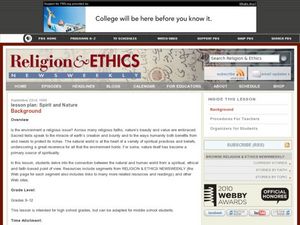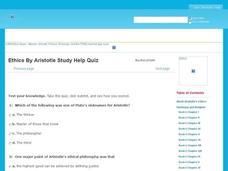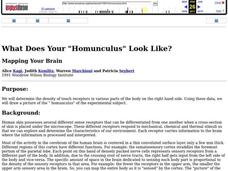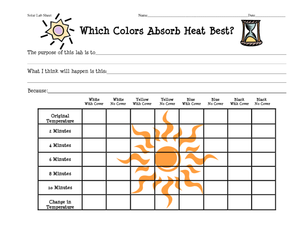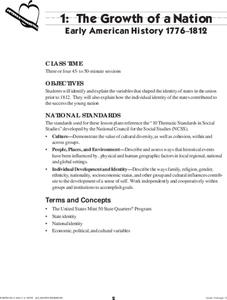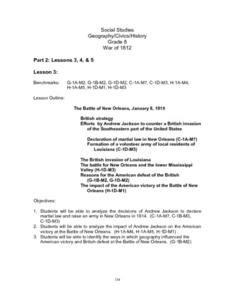Curated OER
Fish Swimming--A Poem by Moniza Alvi
For this poetry analysis worksheet, students read the poem "Fish Swimming," and discuss the metaphors in the poem. Students complete eight activities based on the poem, including rewriting the subject of the poem and watching two...
Curated OER
Essential Elements
A color-coded periodic table identifies organic elements, major minerals, and trace elements. Oxidation states are highlighted and types of chemical bonding are annotated. The electron energy level chart is explained. Though not all of...
Curated OER
A Walk Around the School: Mapping Places Near and Far
After reading Pat Hutchins’ Rosie’s Walk, have your young cartographers create a map of Rosie’s walk. Then lead them on a walk around the school. When you return class members sequence the walk by making a list of how the class got from...
Curated OER
Eminent Domain: Whose Land is it Anyway?
Young scholars research eminent domain and whether or not there has been a land dispute in their community. Students search local newspapers, local history books or talk with civic leaders and long-time citizens and create a chart...
Curated OER
Making & Breaking : The Rock Cycle
Middle schoolers examine the rock cycle and how rocks can change over time. In this geotechnical engineering lesson students draw a diagram of the rock cycle.
Curated OER
English Vocabulary Skills: AWL Sublist 1 - Exercise 4c
In this online interactive English vocabulary skills instructional activity, students answer 10 matching questions which require them to fill in the blanks in 10 sentences. Students may submit their answers to be scored.
Curated OER
English Vocabulary Skills: AWL Sublist 8 - Exercise 5b
In this online interactive English vocabulary skills worksheet, students answer 10 matching questions which require them to fill in the blanks in 10 sentences. Students may submit their answers to be scored.
Curated OER
Spirit and Nature
High schoolers examine sources of spirituality. In this religion lesson, students investigate ties between the spiritual and natural worlds. High schoolers design community and personal projects that feature relationships to the natural...
Curated OER
Ethics: Study Help and Quiz
In this online interactive philosophy activity, students respond to 13 multiple choice questions based on the analysis of Ethics by Aristotle.
Curated OER
Ethics Quiz
In this online interactive reading comprehension worksheet, students respond to 13 multiple choice questions about Aristotle's Ethics. Students may submit their answers to be scored.
Curated OER
Energetic Energy: A Child?s Guide to Responsible Energy Use
Students explore how energy transforms into heat. For this energy lesson students create models and find a need for fuel to make a Stirling engine.
Curated OER
The MPA “GamePlan”
Eighth graders explore the purpose of having Marine Protected Areas. In this environmental science lesson plan, 8th graders simulate the planning process by playing a board game. They explain the positive and negative effects of trade offs.
Curated OER
What Does Your "Homunculus" Look Like?
Students investigate the density of touch receptors in various parts of the body. They discover how the body senses various stimuli, then maps a picture of the "homunculus" of the experimental subject.
Curated OER
NASA Robots
Students explore the world of robotics. In this robotics lesson, students discover what a robot is and work with partners to find out how hard it is to accurately guide robots through simple tasks.
Curated OER
Program Your Partner
Students explore the world of robotics. In this robotics lesson, students study the history of robots and work with partners to find out how hard it is to accurately guide robots through simple tasks.
Curated OER
Utah's Harvest
Fourth graders recognize the importance of the physical geography on a community. In this commodities lesson plan, 4th graders graph the five most important commodities of Utah. Students understand why these commodities are so important.
Curated OER
Cooking with the Sun!
Young scholars access prior knowledge of solar energy and understand that solar energy produces heat. In this solar cooker lesson, students complete grade appropriate experiments using the heat of the sun. Young scholars complete a...
Curated OER
Hip Hop and Geography
Students study the various geographic regions of the U.S. and discuss how popular music is influenced by cultural/regional factors. Groups choose East Coast, West Coast, Midwest, or South in rap/hip hop music and create a PowerPoint or...
US Mint
The Growth of a Nation
Young historians explore the identity of the early United States in this four-part lesson series. Working in groups of three, students research the political, economic, and cultural atmosphere of each member of the union prior to 1812,...
Curated OER
War of 1812
Eighth graders locate the major land forms and bodies of water on a map of Louisiana. In groups, they discuss the role of the Mississippi River in the Battle of New Orleans and how land and water affect the outcome of battles. To end...
Curated OER
Dirty Air And Bright Lights
Students are asked to think about their use of electricity, particularly around the holidays, and how it affects their quality of life and the lives of all of us. They explore the issue by tracing the connections and discussing how and...
Curated OER
Milk and Monarch Butterfly Mania Journal Entry
For this milk and monarch butterfly mania journal entry worksheet, students write a scientific journal entry about the milkweed plant, using the information from another linked website. This worksheet includes many links to other web...
Curated OER
Can young people influence government?
Students, working as a whole class, think about and debate the question of influence. First, there will be some group work then a class debate. The question for debate is: Can young citizens have any influence on governments?
Curated OER
Competing National Stories in Tibet
High schoolers research the Tibetan conflict from the point of view of both Tibet and China. They review resources produced by both factions and then apply these skills to consider other competing national stories.









